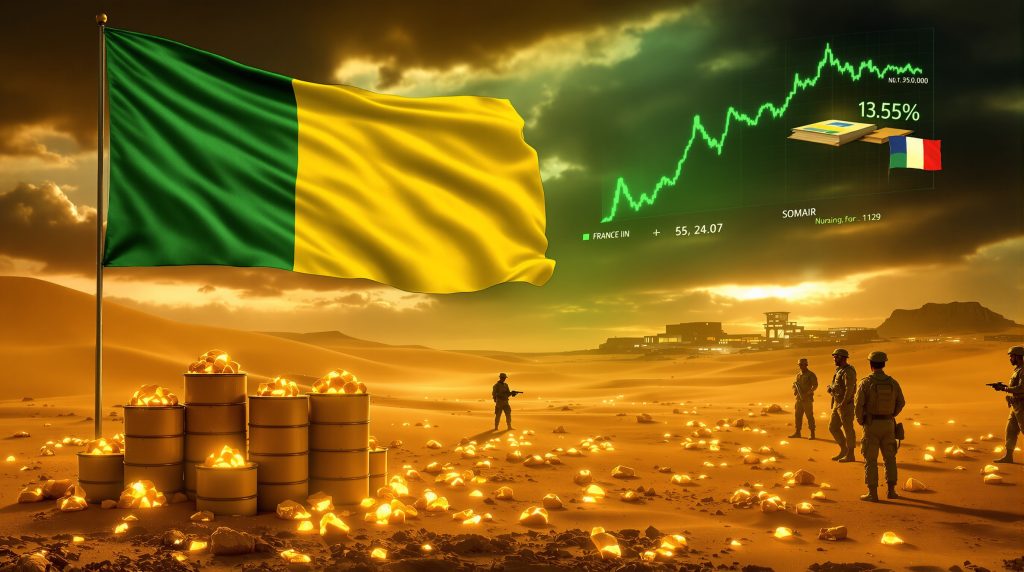Understanding the Niger Uranium Dispute: Stockpiles, Seizures, and Sovereignty
The military regime of Niger has seized control of approximately 1,500 metric tons of uranium from the SOMAIR mine, previously operated by French nuclear company Orano. This stockpile, valued at roughly $270 million at current market prices, represents a significant geopolitical and economic asset in an increasingly complex resource sovereignty landscape across West Africa.
What's Happening with the Seized Uranium in Niger?
The military government's takeover of the uranium stockpile marks a dramatic escalation in the ongoing resource control dispute between Niger and France. The SOMAIR mine, located near Arlit in northern Niger, has been a cornerstone of the country's uranium production since the 1970s, producing over 70,000 tons of uranium during its operational history.
According to industry sources, the seized stockpile contains approximately 1,570 tons of uranium—a strategically valuable resource both economically and geopolitically. At current market rates of approximately $82 per pound, this stockpile represents substantial potential revenue for the cash-strapped West African nation.
The expropriation reflects a broader push toward resource nationalism, with the military government asserting Niger's rights to control and profit from its natural resources rather than allowing foreign companies to extract the majority of the economic benefits.
How Did the Niger Uranium Crisis Develop?
Military Takeover and Resource Nationalism
The seeds of the current crisis were planted in July 2023 when a military coup led by General Abdourahamane Tchiani overthrew the democratically elected government. Following the coup, the junta began implementing policies aimed at consolidating control over Niger's natural resources, particularly the uranium sector long dominated by French interests.
Initially, the military government blocked operations at the SOMAIR mine, creating immediate supply concerns for Orano. By early 2025, the government took the dramatic step of nationalizing Orano's 63.4% stake in SOMAIR, transferring control to Niger's state-owned mining company, SOPAMIN (Société du patrimoine des mines du Niger).
This nationalization followed months of deteriorating relations between Niger and its former colonial power, France, with the military government accusing French companies of exploiting Niger's resources while providing minimal benefits to local populations.
International Legal Challenges
Orano responded to Niger's actions by launching arbitration proceedings at the World Bank's International Center for Settlement of Investment Disputes (ICSID) in January 2025. The company argued that Niger's actions violated bilateral investment treaties and international law regarding expropriation.
In a significant legal development, the World Bank tribunal issued an interim order in September 2025 prohibiting Niger from selling or transferring uranium that had been mined before the military government suspended operations. This ruling represents a partial victory for Orano but leaves unresolved questions about uranium produced after the takeover.
Orano has stated publicly that it will pursue both compensation and criminal charges against any entity that purchases uranium from the seized stockpile without proper authorization, significantly raising the legal stakes for potential buyers.
What's at Stake in the Niger Uranium Conflict?
Strategic Resource Value
The conflict over Niger's uranium resources extends well beyond simple financial considerations. Uranium is a strategically critical element used in nuclear power generation and medical applications, including cancer treatments. With global demand for low-carbon energy sources increasing and numerous countries expanding their nuclear power programs, uranium supplies have taken on heightened importance.
Prior to the dispute, Niger's uranium production accounted for approximately 5% of global supply, making it a significant contributor to world markets. For Orano specifically, Niger's mines represented approximately 15% of their global uranium supplies when operating at full capacity.
The seizure of these resources threatens to disrupt established supply chains and potentially redirect uranium flows to new markets and partners, with global implications for the nuclear fuel cycle.
Financial Implications
The economic dimensions of the dispute are substantial. Uranium market volatility has demonstrated significant fluctuations in recent years, with prices climbing approximately 30% since mid-March 2025, though remaining below the February 2024 peak of $106 per pound.
At current market prices, the 1,500-ton stockpile represents approximately $270 million in potential revenue—a significant sum for Niger, which ranks among the world's poorest countries despite its mineral wealth.
For Orano, the loss of its stake in SOMAIR represents not only the immediate value of the uranium stockpile but also future production potential and returns on decades of investment in developing Niger's mining infrastructure.
Geopolitical Realignment
Perhaps most significantly, the dispute signals a potential geopolitical realignment in the uranium market. Sources familiar with the situation report interest from "Iranians, Russians and Turkey" as potential buyers of Niger's uranium, suggesting the military government may be pivoting away from traditional Western partners toward alternative markets.
Such a shift would align with broader geopolitical trends across the Sahel region, where Russian influence has expanded significantly following a series of military coups in Mali, Burkina Faso, and now Niger. The potential redirection of uranium resources away from Western supply chains could have implications for energy security in Europe and other regions dependent on nuclear power.
How Does This Fit into Regional Trends?
West African Resource Control Movement
Niger's assertion of control over its uranium resources is not occurring in isolation but rather represents part of a broader regional trend. Since 2020, military governments have seized power in Mali, Burkina Faso, Guinea, and Niger—all resource-rich countries with histories of foreign corporate dominance in their extractive sectors.
Each of these governments has implemented measures to increase state control over natural resources. Mali has revised its mining code to increase government revenue shares, Burkina Faso has implemented new regulations on gold exports, and Guinea has renegotiated terms with foreign mining companies operating its substantial bauxite deposits.
This wave of resource nationalism reflects growing frustration among populations and military leaders with perceived inequitable arrangements that have allowed foreign companies to extract significant wealth while host countries remain impoverished.
Changing Power Dynamics
The resource sovereignty movement is accompanied by shifting diplomatic allegiances. At the UN General Assembly, Niger's Prime Minister Ali Lamine Zeine articulated this perspective clearly, accusing foreign firms of decades of exploitation and claiming uranium mining had brought "misery, pollution, rebellion, corruption and desolation" to Niger while enriching France.
These statements reflect a fundamental challenge to the post-colonial economic relationships that have characterized resource extraction in the region for decades. Military governments across the Sahel have expelled French troops and diplomats while welcoming increased cooperation with Russia, China, and other non-Western powers.
The uranium dispute thus sits at the intersection of resource nationalism and great power competition in Africa, with significant implications for future resource development across the continent.
What's the Current Status of the Uranium Stockpile?
Physical Location and Security
According to statements from Orano, the 1500 tons of uranium stockpiled remains physically stored at the SOMAIR site near Arlit in northern Niger. The company claims no knowledge of any production activities or material movements since the military government suspended operations and nationalized the mine.
Security and proper handling of uranium materials present significant technical challenges requiring specialized expertise. While SOPAMIN has taken control of production oversight, questions remain about the capacity of Niger's state mining company to maintain international safety and security standards in uranium handling.
Production Oversight
Current production at the mine is now supervised by SOPAMIN, though industry sources indicate there have been no official sales of the stockpiled material despite significant international interest. The transition from Orano's management to state control represents a substantial technical and operational challenge given the specialized nature of uranium mining and processing.
A source at the mine confirmed that while there has been considerable interest from potential buyers, to their knowledge, "there have been no official sales" of the stockpiled uranium. This suggests the government may be proceeding cautiously in light of the legal complications and international scrutiny.
What Are the Potential Outcomes?
Legal Consequences
The legal dimension of this dispute creates significant complications for Niger's ability to monetize its uranium resources. Orano's pursuit of arbitration and the World Bank tribunal's interim order create substantial legal risk for potential buyers of the stockpiled uranium.
Companies or countries that purchase material from the seized stockpile could face both civil litigation and potential criminal charges in multiple jurisdictions. These legal risks may significantly limit Niger's ability to find legitimate buyers willing to navigate the complex international legal landscape.
The outcome of the arbitration process itself will establish important precedents for resource nationalism cases globally, potentially influencing how other countries approach the renegotiation of mining contracts or nationalization efforts.
Market Impact
The dispute adds another layer of uncertainty to global uranium markets already experiencing significant price volatility. Uranium prices reached multi-year highs in 2024 amid supply concerns and growing interest in nuclear power as a low-carbon energy source.
The potential release or withholding of Niger's uranium stockpile could influence market dynamics, particularly as the material represents a non-trivial percentage of global annual production. Market participants are closely monitoring developments for signals about when and how this material might enter commercial channels.
For nuclear utilities and other uranium consumers, the situation highlights the importance of supply chain diversification and the geopolitical risks inherent in uranium sourcing.
Diplomatic Fallout
The conflict represents a significant deterioration in relations between Niger and France, with broader implications for Western influence in the resource-rich Sahel region. France has historically maintained strong economic and security ties with its former colonies in West Africa, but these relationships have frayed significantly in recent years.
The uranium dispute may accelerate this process, potentially leading to further diplomatic isolation for Niger's military government or, alternatively, to new partnerships with non-Western powers seeking to increase their access to strategic resources.
How Significant Is the SOMAIR Mine?
Historical Production
The SOMAIR mine represents one of Africa's most significant uranium operations. Since beginning operations in the 1970s, it has produced over 70,000 tons of uranium near the city of Arlit, establishing Niger as an important global supplier despite the country's overall economic challenges.
The mine's development played a crucial role in establishing France's nuclear power industry, which today generates approximately 70% of the country's electricity. This historical relationship underscores the strategic importance of Niger's uranium resources beyond their immediate market value.
Regional Economic Impact
Despite its mineral wealth, Niger remains one of the world's poorest countries, highlighting the fundamental tension between resource extraction and economic development that has characterized many African mining operations.
The SOMAIR mine has provided employment and some economic benefits to the surrounding region, but questions persist about the equitable distribution of resource revenues. The military government has highlighted this disparity as justification for its nationalization efforts, arguing that greater state control will ensure more benefits flow to Niger's citizens.
This perspective reflects broader debates across Africa about how best to leverage natural resources for sustainable development while addressing historical inequities in resource extraction arrangements.
What Other Resources Is Niger Controlling?
Expanded Resource Sovereignty
Beyond uranium, Niger's military government has systematically tightened control over the country's diverse resource base, including gold, oil, and coal deposits. This comprehensive approach suggests a deliberate strategy to assert sovereignty over all national assets rather than targeting only the uranium sector.
The government's actions align with a growing consensus among resource-rich African states that previous arrangements with multinational corporations have not delivered sufficient benefits to host countries and communities. This shift toward resource nationalism represents a significant challenge to established business models in the extractive sector.
Economic Strategy
Niger's resource nationalism appears to be part of a broader economic strategy aimed at redirecting revenue flows from foreign companies to state coffers. However, significant questions remain about the military government's capacity to effectively manage these complex industrial operations and secure access to international markets.
The success of Niger's approach will depend on its ability to develop technical expertise, maintain operational standards, navigate international legal challenges, and establish new market relationships—all substantial challenges for a country with limited institutional capacity and facing international scrutiny.
What Does This Mean for Global Uranium Supply?
Supply Chain Disruptions
The seizure of Niger's uranium assets introduces significant uncertainty into global uranium supply chains. While Niger's production represents only about 5% of global supply, disruptions can have outsized impacts in the relatively concentrated uranium market where a small number of producers account for the majority of production.
For nuclear power utilities, which typically secure fuel through long-term contracts to ensure supply stability, the situation highlights growing geopolitical risks in uranium sourcing. These developments may accelerate efforts to diversify supply sources and reduce dependence on potentially unstable jurisdictions.
The disruption comes at a particularly sensitive time as numerous countries are expanding their nuclear power programs as part of climate change mitigation strategies, potentially increasing competition for secure uranium supplies.
Market Price Impacts
Uranium prices have already demonstrated significant volatility, with spot prices increasing approximately 30% since mid-March 2025 despite remaining below the February 2024 peak of $106 per pound. The uncertainty surrounding Niger's production could contribute to further price fluctuations.
For uranium producers in more stable jurisdictions, the situation potentially creates opportunities as buyers seek more reliable supply sources. Companies operating in Australia, Canada, Kazakhstan, and other major producing countries may benefit from shifting buyer preferences toward political stability and supply security.
Alternative Supplier Development
The Niger situation may accelerate efforts to develop new uranium resources in more politically stable regions. Several projects in Canada, Australia, and the United States that were previously considered economically marginal may become more attractive as utilities and governments prioritize supply security over cost minimization.
Additionally, advanced nuclear technologies including small modular reactors (SMRs) are being designed with enhanced fuel efficiency, potentially reducing uranium requirements per unit of electricity generated in the longer term. These technological developments, combined with increased recycling of nuclear fuel, could eventually moderate demand growth.
FAQs About the Niger Uranium Situation
How much uranium is stockpiled at the seized Niger site?
Approximately 1,500 metric tons of uranium are currently stockpiled at the site according to Orano's public statements, with sources at the mine confirming roughly 1,570 tons. This represents a significant quantity of processed uranium concentrate ready for further processing into nuclear fuel.
What is the value of the stockpiled uranium?
At current market prices of approximately $82 per pound, the stockpile is valued at roughly $270 million. However, the actual realizable value depends on market conditions at the time of sale, quality specifications, and the buyer's ability to navigate the complex legal situation surrounding the material.
Has Niger sold any of the stockpiled uranium?
According to sources at the mine, no official sales have occurred despite significant international interest from various potential buyers. The legal complications created by Orano's arbitration case and the World Bank tribunal's ruling appear to have complicated efforts to monetize the stockpile.
What legal actions has Orano taken?
Orano initiated arbitration proceedings at the World Bank's International Center for Settlement of Investment Disputes in January 2025 challenging Niger's nationalization of its assets. The company secured a ruling from the tribunal prohibiting Niger from selling uranium mined before the government takeover and has stated it will pursue both compensation and criminal charges against unauthorized buyers.
Who might purchase Niger's uranium?
While no sales have been confirmed, sources familiar with the situation have indicated interest from Iranian, Russian, and Turkish buyers. This suggests a potential shift in Niger's international commercial relationships away from traditional Western partners toward alternative markets, aligning with broader geopolitical realignments in the region.
How important is Niger to global uranium supply?
Niger ranks as the world's seventh-largest uranium producer, accounting for approximately 5% of global supply. For Orano specifically, Niger's mines previously represented approximately 15% of their uranium supplies when fully operational, highlighting the material impact of this dispute on established supply chains.
Further Exploration
The Niger uranium dispute illuminates broader issues surrounding resource sovereignty, post-colonial economic relationships, and the geopolitics of strategic minerals. As countries worldwide seek to secure supplies of critical materials for energy transition and technological development, similar conflicts over resource control may emerge in other jurisdictions and commodity sectors.
Understanding these dynamics requires considering multiple perspectives—from the legitimate desire of resource-rich countries to maximize benefits from their natural endowments to the security concerns of consuming nations and the investment expectations of mining companies that develop these resources.
The resolution of the Niger uranium dispute will establish important precedents for how similar conflicts might be addressed in an era of increasing competition for strategic resources and changing geopolitical alignments across Africa and other resource-rich regions. Furthermore, the situation reflects broader trends in the mining industry evolution and the impact of recent critical minerals order initiatives by major powers seeking to secure strategic resources.
The outcome could also have significant implications for other uranium producers, including those affected by the recent Paladin Energy uranium halt and ongoing US uranium disruption issues that have further complicated global supply dynamics.
Want to Catch the Next Major Mineral Discovery?
Discover why significant mineral finds can generate substantial returns by exploring Discovery Alert's dedicated discoveries page, where their proprietary Discovery IQ model provides instant notifications on ASX mineral discoveries, empowering subscribers to identify actionable opportunities ahead of the broader market. Start your 30-day free trial today at https://discoveryalert.com.au/discoveries/.




